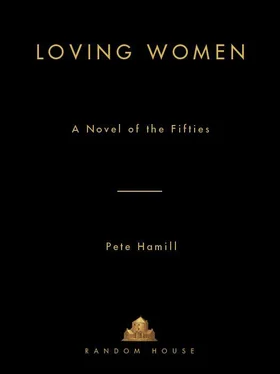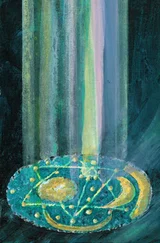“Oh, sure,” I said. “This is my friend, Eden. Eden, this is Jack Turner. Wendell Cannon. Both sailors.”
She shook their hands in a formal way and there was a lot of pleased-to-meet-you and a knowing, admiring glance from Turner to me that said: You’re doin’ okay, sailor …
“Didn’t I see you over at the San Carlos bar last week?” Cannon said to Eden. “With that Mexican flyboy?”
“Not me, mister,” Eden said, and tugged my hand and started away.
“I could swear it was you,” Cannon said. “You got a twin sister?”
She didn’t answer. She led the way to the corner and turned left on Garden Street, away from the lights of Palafox. There were a few blocks of shops and then houses with white porches and swings and she was still walking, still holding my hand, silent until they were far behind us.
“That son of a bitch,” she said after a while.
“Now you know why I didn’t want to see him,” I said.
“With his plastic face and his dead eyes.”
“It ain’t his eyes that’re dead. It’s his heart.”
“Not dead enough,” she said.
We slowed and there was a little park, dark and deserted, with streetlights burning off in the distance through the trees. We sat on a bench. She smoked a cigarette, breathing hard. Saying nothing.
“I’m sorry,” I said.
“For what?”
“For you having to hear that crap about the bar at the San Carlos.”
“It wasn’t crap. I was there.”
“With Tony Mercado?”
“Yes.”
She flipped the half-smoked cigarette into the darkness, where it glowed for a moment and then died. I looked at her, feeling her sudden bitterness and regret rising like an odor, and saw that her eyes were filling with tears. I put my arm around her shoulder and pulled her to me, trying to comfort her. Or trying to comfort myself, holding her to me, to fend off the feeling that she was going away from me without ever having arrived. She pulled away.
“Men,” she said. The word hung in the dark air. I remember seeing myself suddenly like a character in a comic strip. A thought balloon hovered over my head as I sat on a bench beside a woman who was plunged into despair. Inside the balloon were words: “What does she mean by that? Men . Did she sleep with Mercado, the way that blonde obviously did this afternoon? Did she do it for money? Or does she love Mercado? And if she does love Mercado, what does that do to me? How could I compete with him? His looks, his skills, his officer’s bars, his age, his money? His Leica.” Men .
“Well, I’d better go get my bike,” she said.
The balloon dissolved.
“You’re gonna pedal all the way home?”
“No, I take the bus to Ellyson Field, and bicycle the rest of the way.”
She was up now, and I was walking beside her, back to Garden Street. For more than three hours she had been sweet, warm, intimate; she made me try to define myself and my life; she took a drawing that I’d made and rolled it up and put it in her purse; she held my hand in the dark. Now she was going away.
“You want to talk about this?” I said.
“No.”
Then she turned and looked at me. “Hey, listen, child. This’s got nothing to do with you . You’re nice . It’s not you, if that’s what you’re thinkin.”
“But I want to see you again.”
We were crossing the street, going toward Sears.
“I don’t think that’s a good idea,” she said.
“I do.”
“You’re eighteen years old, child. I’m thirty-one.”
“I don’t care.”
“I got two kids.”
“So what?”
“With you, I’m just rockin the cradle.”
“I don’t think so.”
She turned into an alley beside the Sears store and unlocked her bicycle.
“I want to draw you,” I said.
“There must be hundreds of girls your age, you could draw them,” she said, wheeling the bike out of the alley. “That’s what you need. Not an old beat-up lady like me.”
I put my hand around her waist and held her close and kissed her hard on the mouth. She didn’t move. I touched the side of her face and then she shuddered and let the bicycle fall against the wall and she put her hands behind my neck and shoved her belly against mine.
“You silly damn boy,” she said.
I sit here in the car, the engine running, the radio silent. I am parked in an abandoned gas station, the pumps hauled away, a CLOSED sign hanging at an odd angle in the window. Down the wide street to the right is the entrance to Ellyson Field. Once this morning, I drove slowly along the familiar road and even more slowly back, but when I started for the motel, I couldn’t go on. I pulled over, to pause on the broken concrete slabs that once were a wilderness of palmetto weeds and scrub and seem certain to be so again. Billy’s old bar is gone. The locker club is gone. And so too is the airfield. The place is an industrial park now, and there is a school for truckdrivers out on the landing strips. I drove in and saw weeds breaking through the cracks in the tarmac. There was stunted summer-baked grass where the barracks once stood and the mess hall has been gutted and converted to a warehouse. The sky is empty and silent.
And I remember waking the day after my first evening with Eden Santana, hurrying into the gray mess-hall morning, wanting to tell everybody about her. There have been many women since then, but none who made me feel that way, made me want to trumpet the news of their amazing existence. I remember that as a Tuesday morning. She had agreed to see me again on Saturday night: a parenthesis in time, but a stretch of almost endless hours if you were not yet eighteen.
In the chow hall, I sat with Miles Rayfield. I’m sure we were both eating Rice Krispies because just as surely the hot dish was creamed chipped beef on toast, popularly known as SOS, or shit on a shingle. Sure, because I remember him turning to me and saying Snap, Krackle, Pop, you goddamned swabby reprobate. And then he went back to reading a letter. He said it was from his wife. I must have looked surprised (he’d never mentioned her existence), because he chattered away almost desperately about how women never knew what they wanted and his woman knew less than all the others. Now she wanted to be an actress. She wanted to move to Hollywood. She had given up ceramics and was studying Stanislavski from a book. She wanted to meet James Dean. She wanted to work with Kazan. Miles just shook his head. But when I suggested that he have her move to Pensacola, where they could get an apartment and he would pick up extra money from the Navy — they called it comrats — he just shook his head again and said, Ah, well … And mumbled about the terrors of taking a pretty woman to a Navy town. Then he said, Hollywood. Hissed it: Hollywood .
After a while, they all came drifting in: Max and Sal, Waleski and Maher, Harrelson and Boswell and the others, hung over, noisy, laughing. Max came over and told me they were going to the Baptist church on Friday night, to investigate ritual murders for the Anti-Defamation League, and Miles laughed, and Sal said that the two of us had to go with them, to protect Max from the insane Baptists and sinister Masons who infested the place. Miles just smiled and nodded until they moved on to another table, joking and grab-assing.
As always, Miles was holding a Pall Mall with his wrist bent, pressing the butt to his mouth in an almost dainty way. That didn’t matter much to me; Miles was Miles. I wanted to talk to him about Eden Santana, ask him whether I should try hard to find out if she was really married, if she really had two kids, and where the kids were. Or should I ignore all that? Should I press her to find out what happened in the San Carlos bar with Mercado? Was it wrong to feel jealous one minute, elated the next? Miles was twenty-three. He would know about such matters. But I didn’t say anything at all because I realized that I didn’t really know him . I was afraid he would use all those words of his, his scorn and contempt, to make fun of me. He was probably my friend, but I wasn’t really sure. I wouldn’t know until we’d been in some trouble together. I didn’t know yet if any of them were my friends.
Читать дальше












